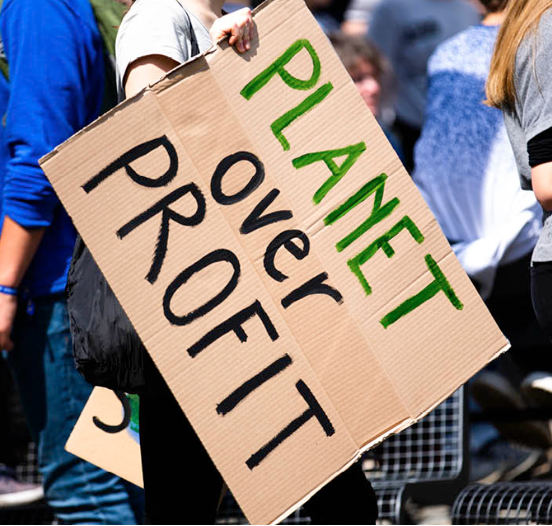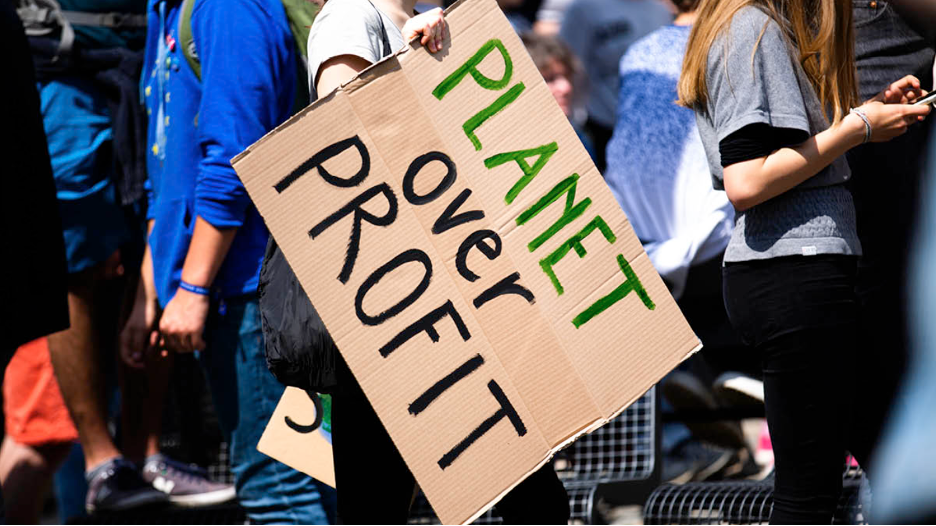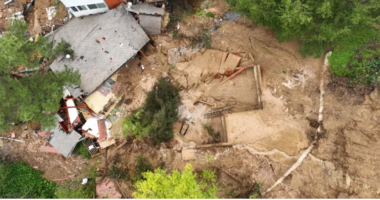Climate, Health and Equity Brief
Climate in the Boardroom and at the Ballot Box
January 29, 2024

The Climate, Health & Equity Brief is GMMB’s take on the last two weeks’ news on the current impacts of climate change. If you haven’t subscribed yet, you can do so by clicking here.
Hot Topic: Shifting sands. In recent years, climate change has become an increasingly polarizing topic—not just in the political realm, but in the business world. First, many corporate leaders are now downplaying their work on climate change out of fear of heightened scrutiny from investors, customers, and the media.
A new study found that 70% of sustainability-minded companies are intentionally hiding their climate-related work—a trend labeled “greenhushing”— even when more than 75% of those companies say they are doing more than ever before to slash emissions. This trend is in sharp contrast to recent years when headlines and ads featured bold corporate promises on climate action.
What’s more, according to PwC’s latest global survey of more than 4,700 CEOs, most chief executives don’t seem to consider climate change a major hazard to their business. Just 12% ranked it as a key threat for 2024—down from 14% in 2023.
And while 30% of CEOs say climate change will “alter the way their company creates, delivers and captures value” over the next three years, fewer than half of those surveyed have incorporated climate risk into their company’s financial planning—and nearly one-third have no plans to do so. Further, while a majority of CEOs report progress on decarbonization, less than one-third have plans for other climate action, such as upskilling their workforce for a net-zero economy or investing in initiatives to protect their physical assets—or workforces—from climate risk.
On the flipside, 41% of chief executives say they are willing to accept lower returns on climate-friendly investments, suggesting that some CEOs are willing to make complex trade-offs as they strive to boost the sustainability of their businesses.
In addition to shifting sands in the boardroom, half the world’s population—more voters than at any time in history—will head to the polls this year, more than 50 countries and the European Union holding elections, 75% of which will be free or partially free. This means 2024 has the largest concentration of elections worldwide for at least the next 24 years—and the outcomes of these elections will have major consequences on climate action, or lack thereof, for years to come.
Human Health
In a new study, a team of researchers from Harvard, Yale, Oxford, and the University of Chicago found that drought, changing temperatures over time, and local perceptions of ecosystem changes are linked to adverse mental health outcomes, including anxiety, depression and suicide. (The Harvard Crimson)
In a joint editorial published in 200 health journals, the global medical community urged the WHO to declare the joint crises of climate change and biodiversity loss a global health emergency given their significant threats to human health and equity. (News Medical)
Planetary Health
A new study is sounding the alarm on the growing impacts of rising sea levels on major port cities across the U.S. East Coast, with scientists predicting an average sea level rise of 2 feet by 2100, which could result in the displacement of over 67,0000 people. (CBS News)
New research provides an updated depiction of how much ice Greenland’s ice sheet has lost, which is roughly 5 trillion metric tons since 1992—20% more than previously estimated. (The New York Times)
Extreme waves linked to rising sea levels swept through the island Roi-Namur in the northern Marshall Islands, flooding a U.S. Army base that houses a space and missile defense test range and some of the Army’s most sophisticated tracking equipment. (ABC News)
A “thousand-year storm” inundated San Diego this week, causing harrowing flash flooding that inundated homes, washed away cars and required hundreds of people to be rescued, some from neck-deep water. (AP News)
Equity
A new study found that climate change could quadruple air quality alerts by 2100, with the steepest rise over the eastern United States coinciding with areas with high Black populations and leakier homes. (News Medical)
FEMA has implemented a new interim rule to streamline applications that makes disaster aid more accessible, a move that is expected to benefit low-income communities and people of color, given that the majority of applicants for federal disaster aid are considered low income and Black Americans are more likely than other demographic groups to live in flood zones. (Inside Climate News)
Politics & Economy
More than 50 countries that together are home to half of the world’s population are poised to hold elections this year, with major consequences for climate agendas and fossil fuel policies around the globe. (Earth.org)
According to PwC’s Global CEO Survey, nearly half of CEOs are willing to accept lower returns on climate-friendly investments, yet fewer than half have incorporated climate risk into their financial planning or have plans to upskill their workforces for a net-zero economy. (Quartz)
The practice of “greenhushing”—companies staying silent on their climate goals to avoid backlash—is becoming more common among climate-conscious companies as they fear heightened scrutiny from investors, customers, and the media. (Grist)
As climate denial videos continue to proliferate on YouTube, a new report shows that over a third of U.K. teenagers believe climate change has been purposefully exaggerated and that climate solutions are not effective. (The Guardian)
The 2024 departures of U.S. and China climate envoys John Kerry and Xie Zhenhua are expected to usher in a new era of climate diplomacy for the world’s top two carbon polluters as both countries work to build upon previous agreements to invest more in renewables and tackle methane emissions. (POLITICO)
Despite a core pillar dedicated to “A Long-Term Strategy for Climate, Nature and Energy,” few leaders at this year’s World Economic Forum annual meeting in Davos made any funding pledges or public commitments. (Devex)
A new analysis has found that to significantly reduce carbon emissions from cars, it is critical to target the top 10% of U.S. motorists—who make up one-third of America’s gas usage—with some states considering legislation to encourage these drivers to switch to electric cars. (The New York Times)
The recent appointment of conservative U.K. politician David Frost—who claimed that rising global temperatures could be beneficial to his country—to a key parliamentary committee on the climate crisis is raising concerns that fringe views on climate are no longer confined to the Tory party’s extremes. (The Guardian)
Action
President Biden vetoed a Republican-led resolution aimed at preventing his plans to invest $7.5 billion in electric vehicle charging stations— an important part of the administration’s fight to slow the climate crisis. (The New York Times)
In a breakthrough for environmental groups, climate activists won a court case against Norway over development plans for oil and gas fields under the sea off the country’s coast, which were created illegally without considering the impact of combustion emissions. (Bloomberg)
Life as We Know It
New York is one of several states proposing that climate change be taught across all grades and subject matters, with other states like New Jersey, Connecticut, and California also working to actively incorporate climate change into curricula. (The New York Times)
Kicker
Want a clear picture of the growth of climate tech across the U.S.? Check out Cipher’s new Cleantech Tracker—a map and investment chart that show the progress of emerging climate technologies.
We all know governments can’t solve climate change alone.
– U.S. Commerce Secretary Gina M. Raimondo
The GMMB Climate, Health & Equity Brief would not be possible without the contributions of the larger GMMB team—Aaron Benavides, Stefana Hendronetto, Nikki Melamed, Sharde Olabanji and Marci Welford. Feedback on the Brief is welcome and encouraged and should be sent to CHandEBrief@gmmb.com.






